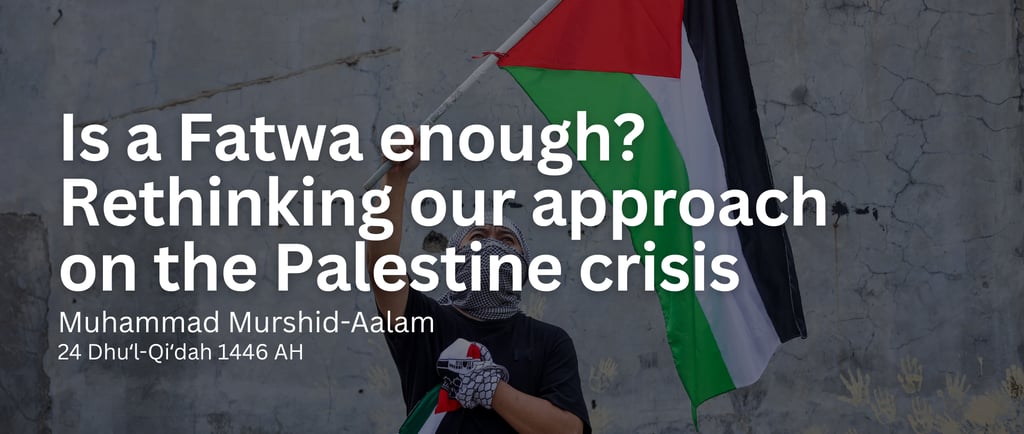
Is a Fatwa enough? Rethinking our approach on the Palestine crisis
Muhammad Murshid-Aalam
24 Dhuʻl-Qiʻdah 1446 AH
Is a Fatwa enough? Rethinking our approach on the Palestine crisis
This article explores the recent fatwas issued by senior Islamic scholars—including Mufti Taqi Usmani and the Grand Mufti of Libya, calling on Muslim nations to take military action to defend Palestine and urging Muslims to redirect their Umrah expenses toward supporting Gaza. It examines the lack of response from Muslim governments, the pushback from figures like Egypt’s mufti, and the deeper issue of political disunity in the Muslim world. The article concludes by outlining the necessary steps, political, strategic, and ideological, required to move beyond symbolic gestures and truly work toward the liberation of Palestine.
ARTICLES


بسم الله الرحمن الرحيم
The current devastation in Gaza has once again shaken the conscience of the Muslim world. Images of bloodshed, families and children buried under rubble, and a besieged population calling for justice have brought out emotions amongst the ummah. In response, senior Islamic scholars such as Pakistan’s Mufti Taqi Usmani and Libya’s Grand Mufti, Sheikh Al-Sadiq Al-Garyani, issued strong fatwas calling on Muslim governments to act, specifically to use their military might to defend the Palestinians, and urged the Muslim public to reconsider performing Umrah, advising instead to direct funds and efforts to support Gaza. But these bold religious declarations have highlighted a deeper issue: What happens when the fatwas are ignored?
“O you who believe, obey Allah and obey the Messenger and those in authority among you. Then, if you quarrel about something, revert it back to Allah and the Messenger, if you believe in Allah and the Last Day. That is good, and the best at the end.”
(An-Nisa, Verse 59)
The Fatwas in Focus
Mufti Taqi Usmani, one of the most respected scholars in the contemporary Islamic world, issued a landmark fatwa calling upon the armies of Muslim nations to intervene and support the oppressed in Palestine and declare Jihad’ against the terrorist occupation. He emphasised that helping the oppressed is not just a matter of charity or protest, it is a divine obligation upon the capable. (Click here for the source)
Simultaneously, the Grand Mufti of Libya, Sheikh Al-Sadiq Al-Garyani, voiced similar sentiments, urging for tangible state-level action against the Zionist entity and encouraging Muslims to channel their Umrah budgets into humanitarian support for Gaza. Sheikh Al-Garyani stated: "Anyone working in the police or security forces in Jordan and Egypt, it's forbidden for him to stand guard to protect the Zionists." (Click here for the source) He further stated, “Arab and Muslim armies, pilots flying MiGs and other aircraft—why do you hesitate? Do you wait for orders from the King of Jordan, the President of Egypt, or the leader of Saudi Arabia? Never! If you do not rise for your dignity, for your brothers, and for your faith, you will perish.” (Click here for source)
These fatwas did not shy away from identifying the failure of Muslim governments to act decisively.
These statements struck a chord with many Muslims worldwide. For once, prominent scholars seemed to be moving beyond general condemnations and towards actionable Islamic mandates rooted in the Quran and Sunnah. But the follow-up, or lack thereof, has exposed a familiar pattern across the Islamic world.
Abu Bakr As-Siddiq (May Allah bepleased with him) reported:
"O you people! You recite this Verse: 'O you who believe! Take care of your ownselves. If you follow the (right) guidance [and enjoin what is right (Islamic Monotheism and all that Islam orders one to do) and forbid what is wrong (polytheism, disbelief and all that Islam has forbidden)] no hurt can come to you from those who are in error.' (Al-Ma’idah, verse 105) But I have heard Messenger of Allah (ﷺ) saying: "When people see an oppressor but do not prevent him from (doing evil), it is likely that Allah will punish them all."
(Abu Dawood and Tirmdhi) (Riyad as-Salihin 197)
The Silence That Followed
Despite the clarity of these fatwas, Muslim-majority governments remained largely silent. No armies mobilised. No embassies were closed. Trade continued. Normalisation talks quietly resumed behind closed doors. And in a shocking twist, Egypt’s state-aligned Mufti, Nazir Ayyad, publicly criticised the fatwas, dismissing them as divisive and "unwise," claiming they would stir confusion and disorder. (Click here for source)
This response reflects a broader and more dangerous crisis: that Islamic scholarship is frequently silenced or ignored or marginalised by political leadership when it contradicts state interests. When governments prefer diplomacy with oppressors over solidarity with the oppressed, even the most authoritative religious voices can be silenced or sidelined.
“O you who believe, what is wrong with you that when it is said to you, go forth in the way of Allah, you cling heavily to the ground. Have you become happy with the worldly life instead of the Hereafter? So, (remember that) the enjoyment of the worldly life is but trivial in (comparison with) the Hereafter.”
(At-Tawbah, verse 38)
A Crisis of Authority and Implementation
Fatwas in Islam are not just mere opinions; they are legal pronouncements from Islamic jurisprudence. During the time of the khilafah, such rulings had weight because they were issued with Islamic authority, the khilafah system could implement them.
Today, however, the Muslim world is fragmented. Nation-states with conflicting agendas, borders drawn by colonial powers, and regimes more loyal to foreign allies than their own ummah, have rendered religious rulings practically impotent at a state level. Scholars speak, but there is no power to act.
This is not to question the sincerity of the scholars issuing these fatwas, but rather to reflect on the absence of an Islamic system of governance that can carry them out. Without political will, fatwas become symbolic gestures, strong in words but lacking enforcement.
What Should Follow a Fatwa?
If Muslim governments refuse to act, what comes next? Historically, Islamic governance operated on the principle that rulers were accountable to the Shariah. A fatwa would be seen as a directive, not a suggestion.
But in today’s landscape, no unified Islamic authority exists. No court can compel governments to act on these fatwas. And this creates a void: the ummah is constantly told what should be done, but not how to ensure it is done. This leads to despair, confusion, and a cycle of frustration.
The Role of the Ummah
Faced with government inaction, Muslims worldwide are left to ask: What can we do?
Many individuals and communities have embraced the spirit of these fatwas, choosing to donate the equivalent of their Umrah expenses to supporting the efforts of the Mujahideen in Palestine as well as the people in need. Others have organised protests, boycotts, and campaigns to raise awareness and pressure institutions.
While these actions are commendable, they cannot replace what a united political front could achieve. Muslims can provide bandages, but they cannot stop the bleeding when the aggressor continues unhindered and unchallenged. This goes back to the core concept of a political problem requiring a political solution and a military problem requiring a military solution. We have to ask ourselves: Will this little amount of money stop missile strikes? Is what I’m doing according to the shariah?
Moving from Symbolism to Strategy
The tragedy of Palestine is not just a humanitarian crisis, it is a political one. And political crises require political solutions.
Fatwas must continue to be issued. Scholars must remain courageous. But the ummah must begin asking the harder questions: Why do our leaders not listen? Why are we unable to enforce Islamic rulings? What kind of leadership and governance do we need to protect our sanctities and uphold justice?
Until we confront these questions, we risk turning our sacred rulings into soundbites—heard but never heeded.
It is time to move from symbolic gestures to strategic goals. The fatwas should not just urge action; they should also spark a conversation about restoring political unity, Islamic leadership, and genuine accountability. Only then will the words of our scholars return to their rightful place: as catalysts for change backed by real power.
What Will It Take to Liberate Palestine?
The tragedy of Palestine is not merely a humanitarian disaster, it is the direct result of political weakness, disunity, and the absence of Islamic authority in the Muslim world. While fatwas from courageous scholars have reminded us of our moral and religious duty, they also expose a deeper truth: without a system to implement them, words cannot stop bullets, and statements cannot liberate a people.
So what is required to truly liberate Palestine?
Political Unity of the Muslim World:
The Muslim world must move beyond fragmented nation-states and divisions. Real change begins when we revive the concept of unity as one ummah’ with one cause. Only with political cohesion can we utilise the economic, military, and diplomatic strength necessary to counter oppression effectively.Re-establishment of Islamic Authority:
Historically, Islamic rulings were implemented by a political authority grounded in Islam, a Khilafah system. Without a centralised leadership accountable to the Quran and Sunnah and bound by the Shariah, our fatwas remain unenforced. The ummah must work towards restoring a governance system that reflects our values, protects our sanctities, and responds to injustice with action, not just words.Ending Normalisation and Dependence:
Liberation requires cutting ties with those who support or arm the Zionist entity. This includes calling out and removing those who call for normalisation deals and addressing those rulers that shield Israel from accountability.Mobilisation of Muslim Armies:
No nation would tolerate ongoing massacres of its people without a military response. Yet Muslim armies, some of the most powerful in the world, remain in barracks. The demand must grow louder: not just humanitarian aid, but military intervention to protect our brothers and sisters.Educating and Mobilising the Masses:
The ummah must become politically aware. We must raise a generation that understands its Islamic identity, sees beyond slogans, and demands structural change. Awareness must lead to organised, strategic political activism aimed at reviving Islamic governance and unity.
“And let there be from you a group inviting to the good, enjoining what is right and forbidding what is wrong, and those will be the successful.”
(Al’Imran, verse 104)
Socials:
https://www.youtube.com/@DeenMachine
https://www.instagram.com/deenmachine1924/
https://www.tiktok.com/@deenmach1ne
Author's Socials:
https://www.instagram.com/muhammadmurshidaalam/


